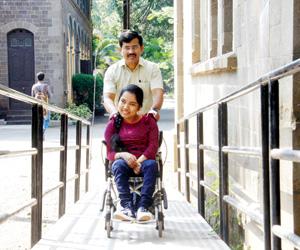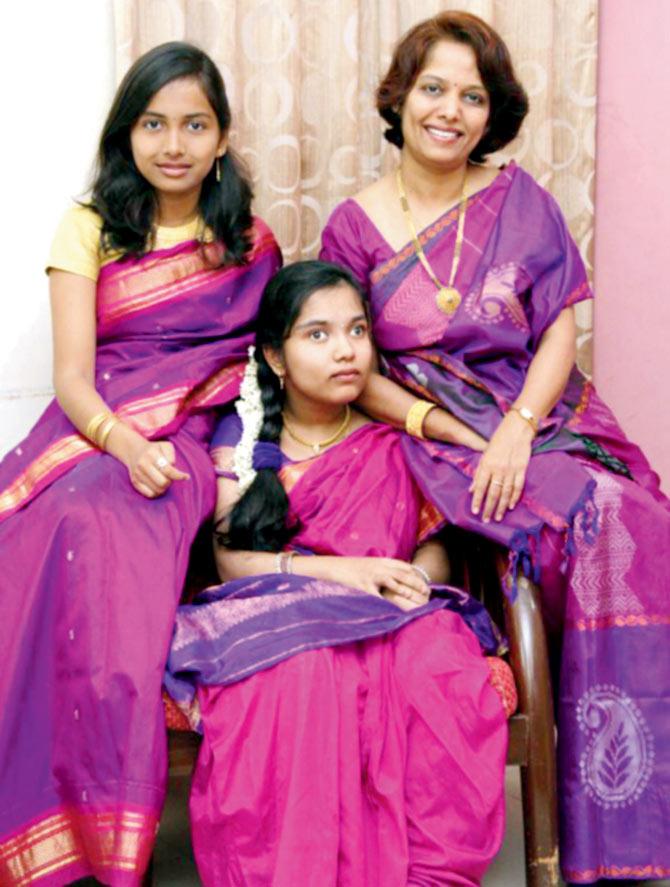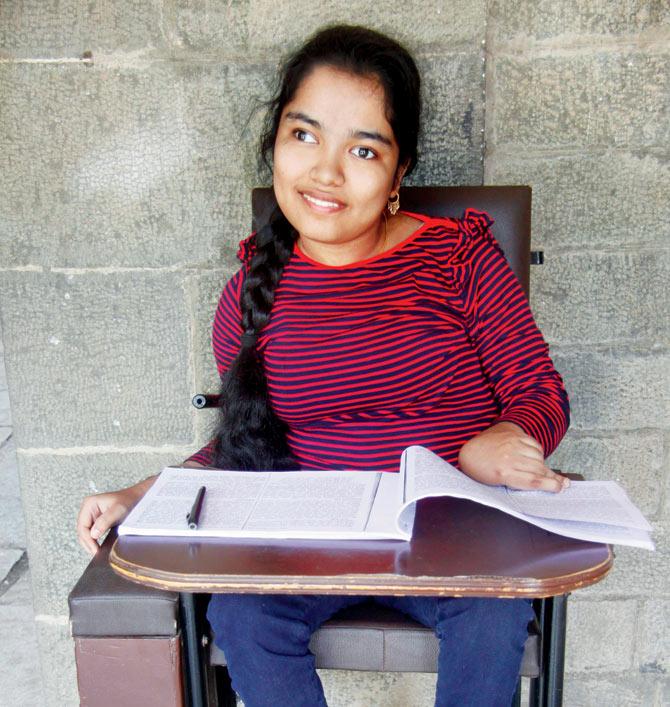A 20-year-old literature student is winning awards for her thoughts and writing, challenging her disability at every turn of life


Tanvi Doke is wheeled into Fergusson College by father Dinesh Doke, who is Additional CEO at the Pune Zilla Parishad. Pic/mandar tannu
ADVERTISEMENT
 Tanvi Doke's confidence is not just enough to help her live the life of any 20-year-old, despite grappling with Locomotor disability, it's sufficient to have her act and share her talent with the world. A video uploaded in July 2017 on YouTube, which identifies the 20-year-old Fergusson College student as its presenter, sees her play the role of a teacher who inspires a teenager to view social media and the Internet as educational tools, instead of a reason for distraction. It's one of the many films that Doke, with help from her father, Dinesh, family and friends, has uploaded this year, hoping to make a change. Amateur in effort the films may be, but the scratchy sound doesn't deflect from the message, as they work towards strengthening her presence online. Dinesh sees this as a way to consolidate Tanvi's position as a role model for India's youth fighting disability.
Tanvi Doke's confidence is not just enough to help her live the life of any 20-year-old, despite grappling with Locomotor disability, it's sufficient to have her act and share her talent with the world. A video uploaded in July 2017 on YouTube, which identifies the 20-year-old Fergusson College student as its presenter, sees her play the role of a teacher who inspires a teenager to view social media and the Internet as educational tools, instead of a reason for distraction. It's one of the many films that Doke, with help from her father, Dinesh, family and friends, has uploaded this year, hoping to make a change. Amateur in effort the films may be, but the scratchy sound doesn't deflect from the message, as they work towards strengthening her presence online. Dinesh sees this as a way to consolidate Tanvi's position as a role model for India's youth fighting disability.
Her condition is one that impacts the bones, joints and muscles, leading to restriction of movement. But, her wheelchair is enough to take her places, including to the Nathu La pass connecting Sikkim with China's Tibet Autonomous Region 4310m above sea level. Tanvi does not wish to be reminded of the things she cannot do. "I am not focussing on how bumpy the ride has been. I am here to share my passage from Junior KG to the tenth standard. If my frail, less-than-a-kilo body could survive the first 21 days in an incubator, there is enough to inspire me for a better life ahead," she says of May I Come In?, her memoir, now in its fourth edition (Granthali publication, R125), which has sold 4,000 copies. It narrates the milestones of her life, delayed by ordinary standards but landmark anyway. Her determination is evident in how she inspires those around her to turn sensitive towards persons with special needs, including her college administrators, who constructed a wheelchair ramp to allow her easy access to the English literature class.

Tanvi's mother Jayashree and sister Ovi have refused to accept that she will live a lesser life because she is a special child
Tanvi's recollection of the seemingly small victories read well, because behind every story lies patience and perseverance, whether it's prepping for a Gandhi Jayanti speech, enjoying the harmonium riyaaz or tasting success at cracking the Math Olympiad. It also narrates the journey of every special child in India, when she speaks of her family's search for home tutors and working with a writer for her final exams.
Now on the cusp of adulthood with audacious plans for the future, Tanvi wishes to join the Indian Administrative Service, contribute to the mainstreaming of India's handicapped and widen the scope of the Rights of Persons with Disabilities Act, 2016. "I am disturbed when I see that first-rate cities like Pune and Mumbai don't offer us facilities — ramps, wheelchairs, special parking zones and toilets — that encourage the disabled to explore outdoor life," says Tanvi, who has a soft spot for the outdoors. Her frequent trips to the cinema, shopping malls and live gig venues are a result of her appreciation for "the energy and stimulus public places offer that the disabled don't wish to lose out on."

In a small effort to contribute to her kind, she has donated her earnings from her six state-level awards, including the Bal Shree Samman instituted by the central ministry of Human Resource Development, for creative writing, to institute scholarships. Her latest donation is a music system for The Poona School and Home for the Blind. "The amount of the donation is immaterial. It is more about a gesture that makes Tanvi supremely happy. It is her way of acknowledging the debt she owes to her teachers, fellow students, relatives and neighbours who helped her achieve academic milestones," says Dinesh, who holds the post of Additional CEO with the Pune Zilla Parishad. Due to his transferable job, Tanvi has changed eight schools across Maharashtra from Kolhapur to Dapoli and Mumbai. The book speaks of this time, and the stories behind every stay, including at Kolhapur's Holy Cross Convent, from where she cleared standard 10 with 83 per cent. Tanvi insists that the logistical adjustments made by the institutions, especially in tier two and three cities, to make the environment inclusive for a physically challenged student like herself, be celebrated.
But her achievements are as much hers as they are of a family that decided it wouldn't succumb to the pressure of raising a special child. Her mother, Jayashree Doke, who is a practicing lawyer, and sister Ovi, double up as escorts, writers and helpers. In fact, the three came together to conjure an invention that they hope can be made affordable and available to the masses once the patent comes through. They designed a foldaway lightweight wheelchair made out of steel scrap and tricycle wheels, using material given by ITI Ratnagiri, while they were stationed in the coastal town. The girls took the lead after the parents introduced them to the ITI to assemble a model of the design that can elevate its user up to 11 steps. This model can come handy for senior citizens too. The design won an award at the National Science Exhibition (2011) in Patna, and the engineering behind it is indicative of how the Dokes constantly strive to make Tanvi's mobility easier.
"We have accompanied Tanvi on all sorts of travels, whether it's to interact with Chinese soldiers across the Nathu La pass or have a dip in the Kanchenjunga waterfall. She gains from each experience. Travelling enables the physically-challenged, and sensitizes people in places they visit," says Dinesh. Fergusson College principal, Dr Ravindrasinh Pardeshi, says Tanvi's comprehension of literature is keen and her classroom presence, positive. "I am certain that she will not just do well academically, but also in society at large. I sense a rare drive in her."
Sumedha Raikar-Mhatre is a culture columnist in search of the sub-text. You can reach her at sumedha.raikar@gmail.com
 Subscribe today by clicking the link and stay updated with the latest news!" Click here!
Subscribe today by clicking the link and stay updated with the latest news!" Click here!






